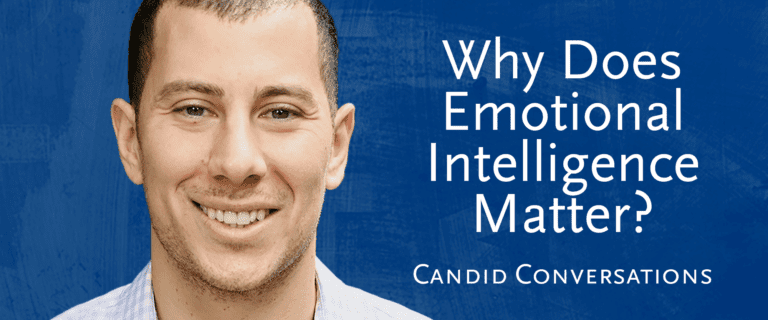Can understanding the buzzword ‘emotional intelligence,’ or EQ, be helpful to us as believers? Join Jonathan and special guest Clay Kirkland as they discuss the ways that developing emotional resilience can help us thrive personally, professionally, and spiritually.
This conversation is condensed and adapted from episode 254 of Candid Conversations with Jonathan Youssef. Be sure to listen to Clay’s insightful interview in its entirety. Subscribe today on your favorite podcast platform or listen online at LTW.org/Candid.
Psalm 139 is a classic for emotional intelligence, especially the end, “Search me and know me.”
Jonathan: Help us define emotional intelligence. What is it and why is it important?
Clay: To boil it down to its simplest form, [there are four key components] to emotional intelligence: Do you know yourself? Can you manage or read yourself? Do you know others? Can you manage and influence others? We are looking for those four quadrants of self-understanding, social understanding, self-leadership, and social leadership.
In the last twenty years or so there’s been a push to raise the importance of EQ—not to diminish IQ, because it’s important to learn, become smart, and develop that part of your brain—but in the past we probably missed it when we were only pushing for people to be smarter or get a certain score on a test.
The Harvard Business Review revealed that there is a gap between good leaders and great leaders, and 80 percent of the contents in that gap are in the emotional intelligence sector. . . . Google did two projects where they studied their employees, and they were very surprised because they had the best and brightest people from Ivy League schools, but they were trying to determine why some teams and individuals were doing better than others. That’s when they started to find out that “soft skills” were trumping hard skills. Nearly everyone came with the same hard skills—the STEM degrees—but not everyone came with coachability, curiosity, emotional intelligence, empathy, and the ability to listen.
Jonathan: I’m picking up on the necessity of being able to understand and know yourself, being able to manage yourself, self-control—it’s a fruit of the Spirit. Let’s bring in the world of theology. How do you differentiate between spiritual maturity and emotional intelligence?
Clay: You are not automatically emotionally intelligent just because you . . . have a relationship with God or you do certain religious disciplines that make you, in the eyes of other people, highly religious or devout. There must be a distinction made there. But, when we look at the practical applications of emotional intelligence and the practical applications of spiritual maturity, we go to the New Testament and look at the fruits of the Spirit.
You start talking about love, joy, patience, kindness, goodness. You get all the way down to self-control. And then you pull those back into the outcomes that emotional intelligence is supposed to create. There are a lot of similarities, right? Obviously, self-control is one. Optimism is a massive one, which we can really link to joy and hope. The kindness piece would clearly cover those kinds of interpersonal relationships. So, it’s not a perfect overlay, but that’s where you see it.
Jonathan: So, we do see this in Scripture, but what about apart from just fruit of the Spirit? Certainly, there’s a high level of EQ that we would see in the Psalms, which maybe explains why David was a good king.
Clay: I love the rhythm of Psalms. There’s this process of raw, honest emotion—all of the good, the bad, and the ugly of life—and then some possible outcomes that either were happening or could happen. Almost every psalm [would reach a point] where [David or the other psalmists] recognize who they are and who God is, what God might do compared to what they might do. Then there’s a surrender of those things that they’ve felt and seen and wanted. You could study that for a long time.
Psalm 139 is a classic for emotional intelligence, especially the end, “Search me and know me.” So there’s self-awareness: I want to be known. “See if there is any hurtful way in me.” That’s David saying he wants to get better. But my favorite part is at the very end where he says, “And then lead me in the way everlasting.”
The reason that’s my favorite part is because it’s saying the self-help movement gets it wrong when it puts navel-gazing and self-awareness as the end goal. Yes, David [is saying,] “I want to be aware of myself. I need to be aware of myself.” But the whole psalm is basically saying, “You’re absolutely aware of me. I’m under the spotlight. I want that awareness, . . . so that I can then go the ways You want me to go.”
Jonathan: We live in a day and age where everything is volatile; people are triggered by anything and everything. How do we develop greater emotional resilience and self-control?
Clay: The assessment that I’m trained to administer to people has various subsets. One of them is flexibility. This is the subset that addresses what to do when things change. You’ve decided something is going one way, but now something out of your control has changed it. How do you respond? On the other side of that coin, the next thing we administer is stress tolerance. Stress tolerance is when you want things to change desperately, and they’re not.
When I look at the volatility of our current culture and social media, you see [these two issues play out]. You have an opinion; someone has the other one. You can’t change their opinion, so what are you going to do about it? Nowadays, we just disrespect the other person. On the other side, when we have a plan that has turned upside down, how do we respond? We blame everyone else instead of moving to that place of resilience and grit.
[In times of stress,] you have six seconds to choose your emotional intelligence response, meaning that your brain likes to default to habits. For example, any time I see traffic, I get angry. My shoulders go up, my eyebrows go down, my tone changes. But the six seconds comes into play in the sense that you can actually choose a different path. Your brain would prefer to go the habitual route because it doesn’t have to work that hard. In all of these things, we’re trying to give ourselves pause enough to recognize when we’re about to default to the wrong choice, and we can train ourselves to a point where we say, “I probably should not do this.” It’s shifting from one train track to another.
Part of emotional intelligence is looking at how you become flexible and better at stress tolerance. A huge part of it is accepting the fact that things are not always going to be good, things are not always going to go your way, and that is everybody’s life. From a Biblical perspective, look at the words of Jesus: “In this world you’ll have trouble.” He’s already told you that you will experience trouble, and He’s already given you the clue [to facing it]: “But take heart! I have overcome the world,” meaning that your perspective is going to change how you respond to those situations. If the weight of the world is on that moment, it’ll crush you. But if you realize that it’s not, you know you can recover and make it through.
Share
Recent MY Journal

Dr. Michael Youssef Announces Transition to Full-Time National and International Ministry
December 19, 2025

He Uplifts the Humble
December 5, 2025
Sign Up for Ministry Updates




